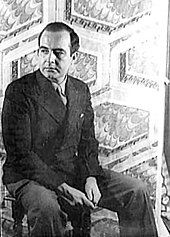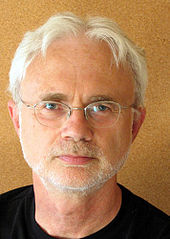Grammy Award for Best Contemporary Classical Composition
| Grammy Award for Best Contemporary Classical Composition | |
|---|---|
| Awarded for | Quality contemporary classical music compositions |
| Country | United States |
| Presented by | National Academy of Recording Arts and Sciences |
| First awarded | 1961 |
| Currently held by | Christopher Rouse for Symphony No. 5 (2021) |
| Website | grammy.com |
The Grammy Award for Best Contemporary Classical Composition is an award presented at the Grammy Awards, a ceremony that was established in 1958 and originally called the Gramophone Awards,[1] to composers for quality works of contemporary classical music. Honors in several categories are presented at the ceremony annually by the National Academy of Recording Arts and Sciences of the United States to "honor artistic achievement, technical proficiency and overall excellence in the recording industry, without regard to album sales or chart position".[2]
The award was first presented in 1961 to Aaron Copland for his Orchestral Suite from The Tender Land Suite. It was not presented from 1967 to 1984. The Grammy is awarded to the composer(s) and the librettist (if applicable) of a classical piece composed in the last 25 years, and released for the first time during the eligibility year. The performing artist, orchestra, ensemble, etc., do not receive a Grammy (except if the performer is also the composer). Since its inception, the award has had several minor name changes.[a]
Composers John Adams, Samuel Barber, John Corigliano and Jennifer Higdon are tied for the most wins in this category, with three each. Multiple composers have won twice: Michael Daugherty, Krzysztof Penderecki, Christopher Rouse and Igor Stravinsky. In one year, 1962, the award was given to two composers, Laurindo Almeida and Stravinsky.
Recipients[]






| Year | Composer | Work | Nominees |
|---|---|---|---|
| 1961 | Aaron Copland | Orchestral Suite from The Tender Land Suite |
|
| 1962 | Laurindo Almeida | Discantus |
|
| Igor Stravinsky | Movements for Piano and Orchestra | ||
| 1963 | Igor Stravinsky | The Flood: A Musical Play |
|
| 1964 | Benjamin Britten | War Requiem |
|
| 1965 | Samuel Barber | Piano Concerto |
|
| 1966 | Charles Ives | Symphony No. 4 |
|
| 1985 | Samuel Barber | Antony and Cleopatra |
|
| 1986 | Andrew Lloyd Webber | Requiem |
|
| 1987 | Witold Lutosławski | Symphony No. 3 |
|
| 1988 | Krzysztof Penderecki | Cello Concerto No. 2 |
|
| 1989 | John Adams | Nixon in China |
|
| 1990 | Steve Reich | Different Trains |
|
| 1991 | Leonard Bernstein | Arias and Barcarolles |
|
| 1992 | John Corigliano | Symphony No. 1 |
|
| 1993 | Samuel Barber | The Lovers |
|
| 1994 | Elliott Carter | Violin Concerto |
|
| 1995 | Stephen Albert | Cello Concerto |
|
| 1996 | Olivier Messiaen | Concert à quatre |
|
| 1997 | John Corigliano | String Quartet No. 1 |
|
| 1998 | John Adams | El Dorado |
|
| 1999 | Krzysztof Penderecki | Violin Concerto No. 2 "Metamorphosen" |
|
| 2000 | Pierre Boulez | Répons |
|
| 2001 | George Crumb | Star-Child |
|
| 2002 | Christopher Rouse | Concert de Gaudí |
|
| 2003 | John Tavener | Lamentations & Praises |
|
| 2004 | Dominick Argento | Casa Guidi |
|
| 2005 | John Adams | On the Transmigration of Souls |
|
| 2006 | William Bolcom | Songs Of Innocence And Of Experience |
|
| 2007 | Osvaldo Golijov | Ainadamar |
|
| 2008 | Joan Tower | Made In America |
|
| 2009 | John Corigliano | Mr. Tambourine Man: Seven Poems Of Bob Dylan |
|
| 2010 | Jennifer Higdon | Percussion Concerto |
|
| 2011 | Michael Daugherty | Deus ex Machina |
|
| 2012 | Robert Aldridge | Elmer Gantry |
|
| 2013 | Stephen Hartke | Meanwhile - Incidental Music To Imaginary Puppet Plays |
|
| 2014 | Maria Schneider | Winter Morning Walks |
|
| 2015 | John Luther Adams | Become Ocean |
|
| 2016 | Stephen Paulus | Prayers and Remembrances |
|
| 2017 | Michael Daugherty | Tales of Hemingway |
|
| 2018 | Jennifer Higdon | Viola Concerto |
|
| 2019 | Aaron Jay Kernis | Violin Concerto |
|
| 2020 | Jennifer Higdon | Harp Concerto |
|
| 2021 | Christopher Rouse | Symphony No. 5 |
|
| 2022 | Winner TBA on 3 April 2022 |
|
Notes[]
- ^
- From 1961 to 1962 the award was known as Best Contemporary Classical Composition
- In 1963 it was awarded as Best Contemporary Composition
- In 1965 it was awarded as Best Composition by a Contemporary Composer
- In 1966 and 1964 it was awarded as Best Composition by a Contemporary Classical Composer
- In 1985 it was awarded as Best New Classical Composition
- From 1986 to 1994 it was again awarded as Best Contemporary Composition
- From 1995 to 2011 it was again awarded as Best Classical Contemporary Composition
- In 2012 the category was renamed into Best Contemporary Classical Composition
References[]
- ^ "Grammy Awards at a Glance". Los Angeles Times. Archived from the original on March 9, 2012. Retrieved April 24, 2010.
- ^ "Overview". National Academy of Recording Arts and Sciences. Archived from the original on January 3, 2011. Retrieved April 24, 2010.
- ^ "Grammy Awards Winners & Nominees for Best Classical Contemporary Composition". The Recording Academy. Retrieved 21 August 2021.
- Grammy Awards for classical music

